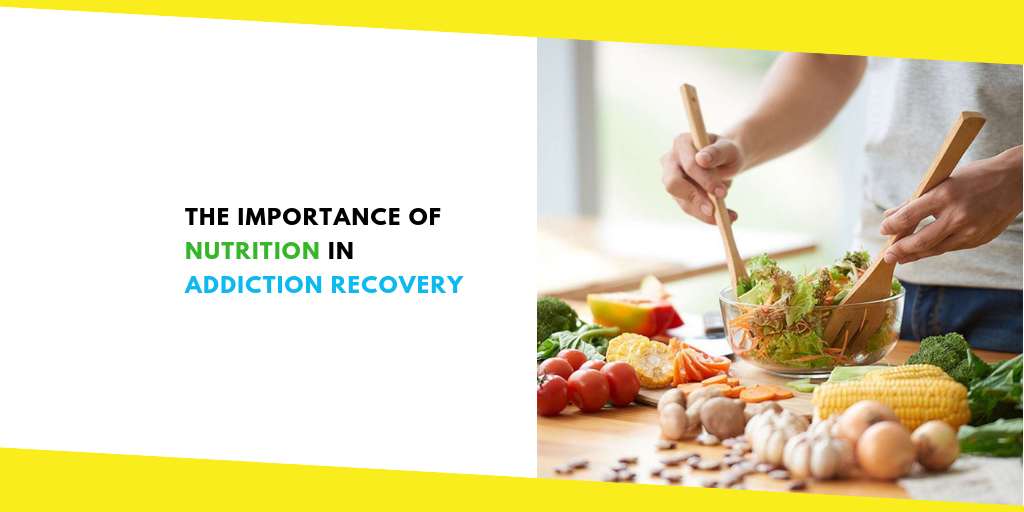The Importance of Nutrition in Addiction Recovery
This post was last updated on March 25th, 2024
An illness as chronic as addiction may seem to have little to do with healthy eating habits or balanced nutrition.
However, sufferers generally neglect their diet and the combination of a lack of nutrients in the body with alcohol or drug abuse can be very damaging, particularly if over a prolonged period of time.
Although many drug addiction treatment centers don’t have a focus on nutrition, the best holistic centers do. The body’s ability to function normally is considerably impaired when individuals are malnourished. Over time, poor nutrition can lead to serious vitamin deficiencies, electrolyte imbalances and in very severe cases, death.
Why Is Nutrition So Important?
Food is vital fuel for the brain and body and allows it to function normally by providing energy throughout the day. As we digest food, it is broken down into glucose which is then released into the bloodstream and stored as an energy supply in the body.
In order to thrive, we need a variety of foods. Although carbohydrates are effective in providing a short-term energy boost, a good diet should be balanced with proteins and healthy fats which can be preserved in the body for longer. One of the key objectives of alcohol and drug addiction treatment is to promote a healthy lifestyle and maintaining a balanced diet is an important component in achieving this in an alcohol and drug rehab center.
How Addiction Affects Diet and Nutrition
Addiction is an all-consuming illness that makes people neglect themselves including their diet. Rather than spending time, money and effort on creating a healthy lifestyle, addicts divert these resources to fuel their compulsion to abuse drugs or alcohol. Ultimately, procuring and using drugs or alcohol becomes a preoccupation for addicts and everything else tends to fall by the wayside.
As an addict continued to abuse substances and neglect their diet, the lack of nutrients will start to interfere with the individual’s ability to function. Some of the characteristic food-related behaviors exhibited by addicts include the following:
Not eating: The effects of drugs and alcohol often suppress the appetite of the user, meaning they are likely to forget to eat when they are under the influence.
Eating unhealthy food: Because of the lifestyle associated with addiction, it is likely that addicts will eat convenience foods or snacks rather than substantial and nutritious meals.
Binge eating: Although the influence of alcohol and drugs suppresses the appetite, when a user comes down from a high they may suddenly become very hungry, making them prone to eating even after they are full.
When an individual has been abusing substances for months or even years, the effects on the body can be significant. The accumulative effect of regularly eating meals lacking the vital nutrients we need to function is very damaging, although with nutritional education in drug detox centers it is very possible to reverse these negative effects.
How Addiction and Poor Diet Affects the Body and Brain
As we have seen, an unhealthy diet and addiction often go hand-in-hand which can be very disruptive on essential brain and body function. In severe cases, individuals in rehab centers can be suffering from malnutrition which can manifest in various ways including:
- Lowered body temperature
- Depression and anxiety
- Muscle deterioration
- Inconsistent heart rate
- Vitamin deficiencies
- Electrolyte imbalances
Other side effects relating to specific substances include:
Opioids and Heroin: A common side effect of opioid or heroin abuse is chronic constipation, with around 80% of opiate addicts suffering from the condition, according to the International Journal of Clinical Practice.
Alcohol Abuse: Chronic alcohol abuse can severely disrupt the body’s ability to absorb vital nutrients which can damage the stomach lining and lead to digestive enzyme deficiency. Alcohol abuse also damages the pancreas which is responsible for processing lipids, proteins, carbohydrates and the hormones that keep blood sugar levels balanced. If the pancreas is not functioning properly, it can develop into an irreversible condition that has the potential to be deadly.
Stimulant Abuse: Drugs like cocaine and amphetamines create a euphoric high that can lead to users being hyperactive for days at a time. Stimulants also suppress a user’s appetite, which is why many of us prefer a morning coffee to a healthy breakfast. People who regularly abuse stimulants face a high risk of malnutrition unless they seek treatment.
Nutrition in Addiction Recovery
“We are what we eat” the expression goes and this is now an established fact. A balanced diet is an extremely powerful tool in the fight to overcome addiction. The differences sound nutrition can make include the following:
- Reduces mood swings to achieve a positive outlook
- Increases memory, focus, and concentration
- Boosts energy levels and productivity at work or home
- Strengthens the immune system and protects the body from infection
The benefits that are available from incorporating healthy nutrition into a drug addiction treatment program are enormous. Ultimately, the objective of alcohol and drug rehab centers is to set and achieve recovery goals while finding the balance of mind, body, and spirit in sobriety.
Recommended For You
4 Different Ways To Cure Herpes Naturally
Most Inside
Most Inside offers high-quality recommendations and valuable updates to enhance all aspects of your life, providing premium guidance and enriching experiences.





